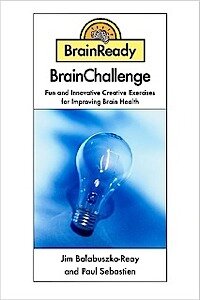
One of the appeals of brain-boosting foods & supplements is that we can usually manage to squeeze them into our already-busy lives: we already need to eat, we take a multivitamin, we make time for these things. So it's not a stretch to add more foods and supplements that have added benefits.
But when it comes to making brain exercises a routine, daily activity, it can be hard to find the time to fit it in, or even to remember to do it (ah, the paradox...).
Chances are, you're not only taking care of your own life, but you're also caring for others - aging parents, a spouse, or kids of your own, while also trying to keep your house/bills/groceries/health/life/sanity in order.
Right? In fact, you're probably making it to the end of each day saying, "oh yeah, I forgot...I need to do those brain exercises so my brain doesn't go to pot...I'll do that TOMORROW" (right after I get back from the gym...and the dentist...and the post office...and the store...ha!)
Well, don't feel badly: at BrainReady, we know all about being busy, so we've got a few tips to help you squeeze brain exercises into your typical busy days.
So, welcome to Part 1 of our "Brain Tips for Busy People" series, and we think they'll help to make it even easier (meaning less excuses!) to incorporate daily brain exercise into your busy life. And as always, please share YOUR tips with us so we can share them with everyone here...by emailing us at
On to our first set of tips:
If you're a parent or grandparent (and if not, read on!), bedtime with young kids can be the best part of the day, reading stories out loud to them. But you don't need young kids around to make a practice of reading out loud each day, as EVERYONE should be doing this, young or old: did you know that this simple activity (reading out loud) is actually one of the best brain exercises you can possibly do?
Reading out loud exercises your brain in a way that reading silently does not. It essentially requires that you process the information you're reading TWICE - the first pass is the basic comprehension, the second pass is remembering how to make the right sounds.
Actually, there are multiple brain-taxing activities happening simultaneously: there's advance scanning (reading ahead) involved so that your brain is also forced to read ahead in order to prepare the translation to your speech faculties, including all intended inflections that are contextually relevant to the sentences in-progress. And then when you count that you are also listening to yourself as you read, modulating your timbre and volume in real-time as you hear how you sounded (all while scanning ahead and speaking and thinking about the contents of what you're reading), it becomes clear just what an engaging, taxing exercise reading out loud really is.

Particularly with somewhat complex reading material.
Yes, the complexity of the material DOES make a difference, so your twentieth reading of "Everybody Eats" is not going to be as good as reading a chapter of , or pondering (real-time while reading out loud) the sublime, poetic subtleties of James Joyce's finest.
So bear that in mind: if you do have smaller kids or grandkids, consider moving to chapter books sooner than later, even if they aren't able to follow all of the intricacies of the plots. They'll surprise you with what they DO retain.
Now, for those of you who don't do the bedtime reading thing:
As you read your newspaper or web sites in the morning, pick an article and read it out loud in its entirety, ideally one of the more complex ones that may contain unfamiliar topics, words and phrases. You don't have to do it at full volume. You can speak quietly to yourself as long as you are fully annunciating and applying the same inflection, tone and overall performance as if you were reading to a room full of people.
Memory and comprehension: interestingly, you'll probably find that as you go through your day, the one article that you read out loud will be the one you remember in greatest detail later in the day!
And finally, a very important note: as you read anything, if you come across a word that is unfamiliar, stop for a moment and say it out loud at least three times -- thinking about the word and its meaning, focusing on pronouncing it correctly, really absorbing it into your vernacular. If you really can't figure it out from the context, think about looking it up: every Macintosh sold in the past few years has a built in dictionary (by pressing F12). Or, try the free online encyclopedia Wikipedia (http://www.wikipedia.org).
Taking time for this step is very important: if you had simply glossed over it while reading silently and ignored it, chances are it slipped from your mind by the next sentence. By pausing and engaging your voice, you are essentially "adding" that word to your vocabulary. Then you've done TWO exercises - reading out loud AND learning a new word!
This all may seem pretty simple - but that's the whole point: it's almost a chore NOT to do them when you make them habitual and instinctual like this!
Next tip: Use your Drive Time!
Most of us have 20-40 minutes (or more) of car time every day. Even those seemingly "short" trips to the store or post office or dentist can actually consume significant portions of your day (stuck in your car, mentally numb).
So, why not use that time to listen to the free Brainready brain exercise podcasts, which are designed specifically to be listened to in such situations as driving, exercising, walking, eating meals, etc.? No, this is not a 'pitch' for our Podcasts: they're free, and we really did design them so that people like you who are busy and just don't have the time to sit at a computer doing countless visual brain exercises can finally get a great mental cross-training workout while you're busy (in this case, captive in your car) doing other routine things that you already do.
We know what you're thinking: I don't have one of those new cars with the iPod jack built in - how will I do that? Or, I don't know how to burn cd's of Podcasts...sounds complicated and time-consuming.
Well, don't worry: all you need is your computer (with CD-R drive, which most PC's and Macs have had for years now) and the free Apple iTunes software that you can download from if you don't already have it.
With iTunes for PC or Mac, you can copy our free BrainReady Podcasts to audio CD's that can be played in your car or home stereo or anywhere, incredibly quickly and easily. And, at least two to three BrainReady Podcasts fit on a blank CD, blank CD-R discs cost mere pennies these days, so this is a pretty cheap solution...one that will turn your otherwise mind-numbing drive time into one of the most important things you get done during your day -- getting your most important asset back into shape, your brain!
Here's how easy it is to put our Podcasts on CD:
Step 1: In Apple iTunes, click on the 'Store' link on the left-hand links area. Once in the store, type "brainready" into the Search box near the top right of iTunes. That will bring you to our . Then, just click 'Get Episode' next to each of the BrainReady Podcasts that you'd like to download.
Step 2: Now that you have downloaded the BrainReady Podcasts, click on the 'Podcasts' link (under Library) on the left-hand list of links in iTunes...where you'll see your Podcasts that you just downloaded, among others you may have downloaded. Click the check-boxes next to the episodes that you want to record to a blank CD, and uncheck the rest; note that only 2 or maybe 3 Podcasts fit on a regular blank CD, so best to start with just 2 Podcasts.
Step 3: Insert a blank CD-R into your computer's CD-ROM drive. Shortly thereafter, iTunes should now show a 'Burn CD' icon near the top right of iTunes. Click this to start burning your Audio CD.
...that's it!
When it's done writing to CD, you can play this audio CD in your car, home stereo, anywhere. (For more detailed instructions, troubleshooting, etc., please refer to the built-in iTunes Help menu or the Apple web site, or email us and we'd be happy to help).
Now, while you're burning CDs, why not make some CD's of other great brain-enhancing Podcasts as well? While there's really nothing else like our BrainReady Podcasts out there, we're also big fans of foreign language training podcasts, which push us to use different parts of the brain and harken back to those long-ago school days when our brains were (forcibly) more active. All of these are available free from iTunes - search on the words in "quotes" to find in the iTunes store:
- Learn Japanese with "japanesepod101"
- French news and commentary from Radio France with their "France Bleu" podcasts
- Spanish interviews from BBC Radio "Estudio 834"
- German interviews with Deutschlandfunk "dradio kulturinterview"
So - turn off the talk radio for a while, and plug in your iPod or pop in a custom Podcast CD to exercise your brain while you're driving...and turn that drive time into one of the most important self-improvement times of your day.
- The BrainReady Team
(We'll be back in a few days with more tips, but in the meantime, if you have a favorite Podcast or some of your own Brain Tips for Busy People to share, use the Comments link below and let all of us know! And share your suggestions and tips with us so we can include them in upcoming Blog and Podcasts, by emailing us anytime at )




